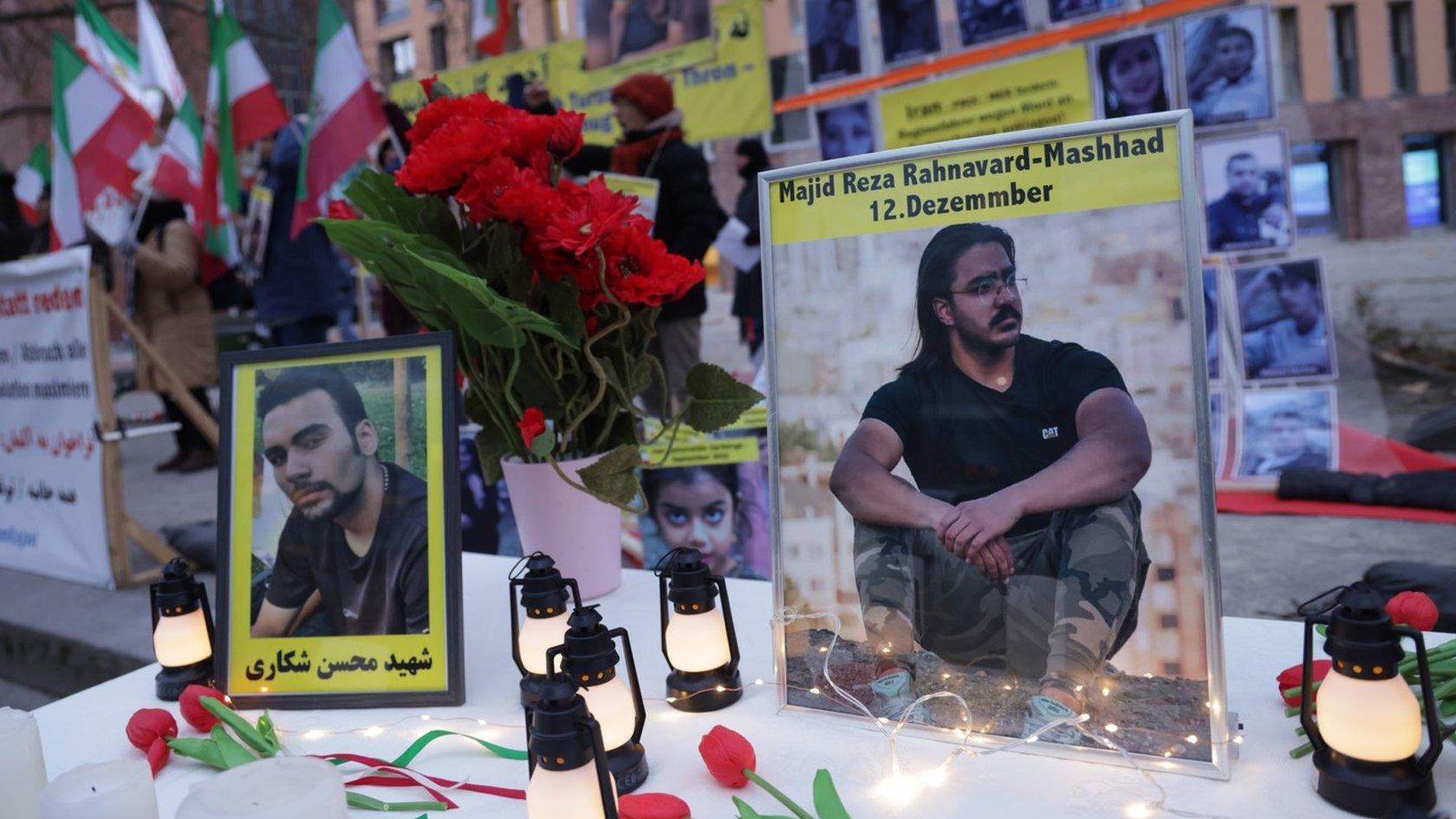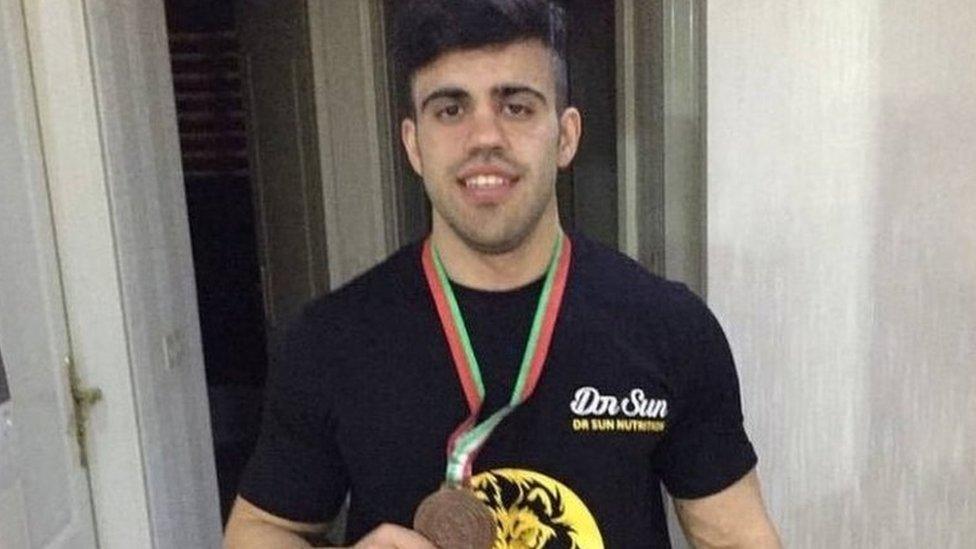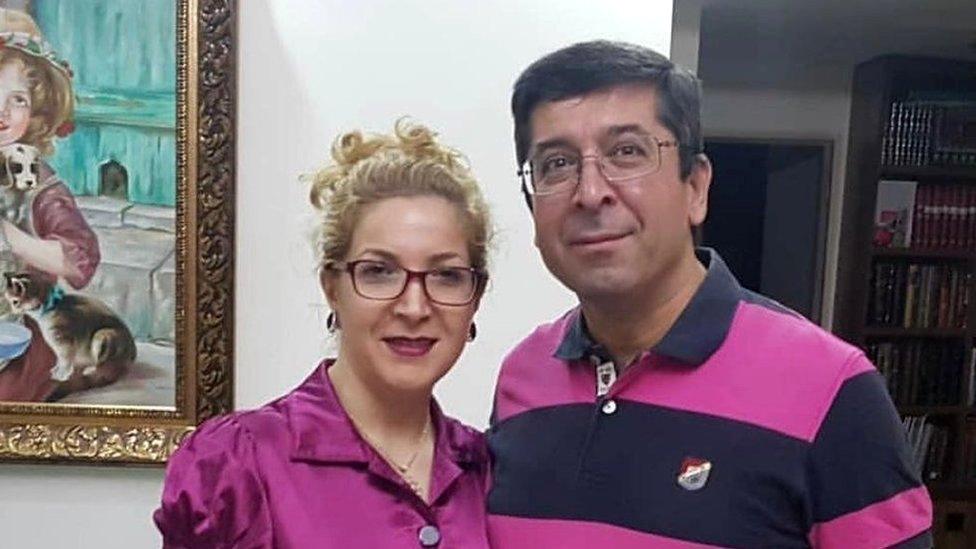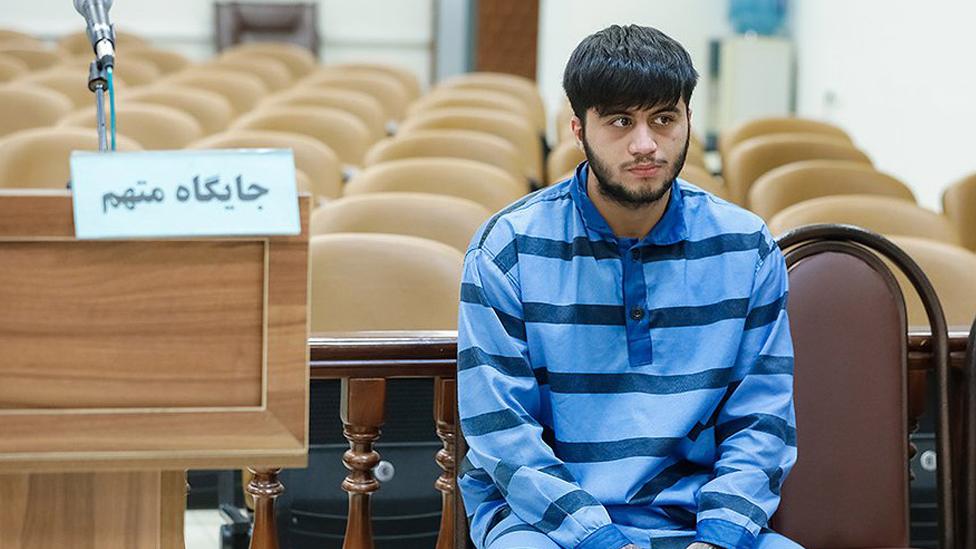Who are the protesters facing execution in Iran?
- Published

Mohsen Shekari (L) and Majidreza Rahnavard (R) were executed after being convicted of "enmity against God"
Authorities in Iran have executed two men convicted of vaguely defined national security charges linked to the anti-government protests that have swept across the country, after what human rights groups have condemned as gross miscarriages of justice.
The judiciary said Mohsen Shekari, 23, was hanged last Thursday in the capital, Tehran. Four days later, another man of the same age, Majidreza Rahnavard, was executed in public in the religious city of Mashhad.
Both were found guilty by Revolutionary Courts of "moharebeh" - roughly translated as "enmity against God". Under Iranian law, the crime is defined as "creating public insecurity" by threatening lives or property with a weapon.
All of those sentenced to death so far were not allowed to appoint their own lawyers and instead had to rely on state-appointed lawyers who did little to defend them. Their trials were short and relied on "confessions" that activists say security forces often obtain through torturing detainees, harassing their families, or promising lenient sentences.
It is difficult to get a full picture of who is at imminent risk of execution, because the judiciary has not disclosed their identities and other authorities have been pressuring their families to not speak to the media.
But this is what we know about those whose cases have been made public.

Sahand Noormohammadzadeh
The 26-year-old amateur bodybuilder was sentenced to death in November after he was found guilty of "enmity against God". He was accused of blocking traffic on a highway by tearing down railings during a protest in Tehran on 23 September, which he denied.

Sahand Noormohammadzadeh, a bodybuilder, maintained his innocence at his trial last month
In an audio message obtained by BBC Persian, Sahand Noormohammadzadeh says those who arrested him, his interrogators and later his prosecutor all told him he would be executed.
He says his fate was determined before his trial. "As soon as I set foot in the prosecutor's office, he said: 'It's written on your forehead: execution! Hang him!'"
An informed source also said he was tricked into signing a letter of apology.
Noormohammadzadeh alleges that he has been subjected to several mock executions in prison. "They call me saying it's time for your execution," he says, adding that he feels under immense mental pressure.

Hamid Ghare-Hasanlou
Hamid Ghare-Hasanlou, a 53-year-old radiologist, and his wife, Farzaneh, were among 15 people found guilty of "corruption on Earth" in connection with the killing of a member of the paramilitary Basij Resistance Force in the city of Karaj on 3 November.

Hamid Ghare-Hasanlou and his wife, Farzaneh
The couple were returning home after a protest in Karaj, near Tehran, when they witnessed the attack on the Basij member.
A friend, Dr Hamid Hassani, told BBC Persian they dissuaded protesters from beating the man, who died as a result of the attack.
"Hamid also saved the life of a clergyman who was wounded on that day," Dr Hassani said.
The couple were arrested in a violent raid on their home the following morning in front of their 13-year-old daughter, who was threatened and told to keep quiet about the arrest.
BBC Persian has obtained X-ray images that show how three of Dr Ghare-Hasanlou's ribs were broken, piercing his lung. An informed source told Amnesty International that he was subjected to torture and ill-treatment in order to extract a forced "confession".
Dr Ghare-Hasanlou, was sentenced to death and Mrs Ghare-Hasanlou to 25 years in jail.
In a "confession" obtained under torture, Mrs Ghare-Hasanlou said her husband "might have kicked the Basij member once", according to her brother.
He said that she was severely beaten, and suffered head injuries, and that Iranian authorities also threatened to kill her son.

Saman Yasin (Saman Seyedi)
The Kurdish-Iranian rapper from the western city of Kermanshah was sentenced to death after he was found guilty of "enmity against God". He was arrested in Tehran, accused of setting a bin on fire and shooting a gun three times into the air, which he denied.

Human rights groups say rapper Saman Yasin was tortured in detention
The Kurdistan Human Rights Network, a non-governmental organisation, said Saman Yasin was tortured while in detention. "He was kept in a cold place for three days, severely beaten and dropped from a height," it alleged.
Before his arrest, he had posted several Instagram stories in support of the anti-government protests.
His songs were also critical of the establishment. In the music video for the song, Haji, he raps about economic hardship, inequality and corruption during a dramatic reconstruction of an arrest, torture and a sham trial. He starts the song by saying: "I resisted the morality police. They choked my throat. They banned my happiness and hung me upside down like a beast."
Saman Yasin's mother released a video last week in which she pleaded to Iranians and the international community to take action to save him before "the noose is around his neck".
"Where in the world someone's life is taken for setting a bin on fire?" she asked.

Mahan Sedarat Marani
The 23-year-old's family had believed that his execution was imminent until Wednesday, when his lawyer was reportedly informed that his death sentence had been suspended pending further consideration by the Supreme Court.

Mahan Sedarat Marani's death sentence has reportedly been "halted" by the Supreme Court
State media reported on 3 November that Mahan Marani went on trial before a Revolutionary Court in Tehran on the charge of "enmity against God". He was accused of wielding a knife during a protest in the capital on 12 October, stabbing and wounding another man, and causing damage to private property by setting a motorbike on fire.
According to state media, he admitted in court that he set the motorbike on fire, but he denied using a knife or stabbing anyone. A private plaintiff who made the allegations withdrew his complaint, but prosecutors continued to pursue the charge of "enmity against God" and he was found guilty.
"Don't be stressed sweetheart. Be patient for a couple of weeks and I'll be out," Mahan Marani can be heard telling his girlfriend in a recent audio message posted on social media.